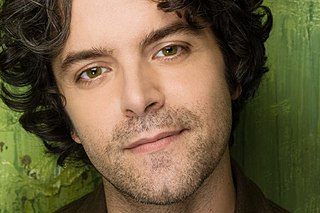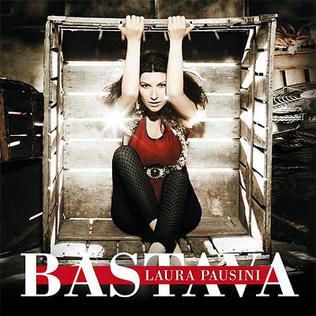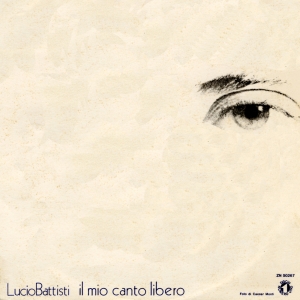
Laura Pausini is an Italian singer and songwriter. She rose to fame in 1993, winning the newcomer artists' section of the 43rd Sanremo Music Festival with her debut single "La solitudine", which became an Italian standard and an international hit. Her self-titled debut album was released in Italy on 23 April 1993 and later became an international success, selling two million copies worldwide. Its follow-up, Laura, was released in 1994 and confirmed her international success, selling three million copies worldwide.

Samuele Bersani is an Italian singer-songwriter. He received the "Mia Martini" Critics Award at the Sanremo Music Festival in 2000 and in 2012, with the songs "Replay" and "Un pallone", respectively. His best known songs also include "Giudizi universali", released in 1997 and certified in 2017 as a platinum-selling single by the Federation of the Italian Music Industry, and "Spaccacuore", which was later covered by Italian singer Laura Pausini.

Emanuela Trane, stage name "Dolcenera", is an Italian singer, songwriter and actress. She rose to fame in 2003, after winning the newcomers' section of the Sanremo Music Festival, but she achieved commercial success in Italy only in 2005, when she won the music-based reality show Music Farm and she released her second album, Un mondo perfetto. In 2005 she was also awarded Best New Artist of the Year at the Italian Meeting of Independent Record Labels and she received the De André Award for Best Emerging Artist.

"La solitudine" is a song by Italian pop singer Laura Pausini, released as her debut single by CGD in February 1993. Pausini sang it for the first time on 23 February 1993, during the 43rd Sanremo Music Festival. On 27 February 1993, the song was announced the winner of the competition in the newcomers' section, receiving 7,464 votes. The single reached number five on the Italian Musica e dischi Singles Chart and later became an Italian standard. A few months after its original release, "La solitudine" was included in Pausini's self-titled first album, released on 18 May 1993.

The discography of Laura Pausini, an Italian pop singer, consists of fifteen studio albums, one compilation album released for the Anglophone market only, two international greatest hits album, three live albums and five video albums, including the live DVD Amiche per l'Abruzzo, released as part of the all-female Italian ensemble of the same name.

Laura Pausini is the debut album by Italian singer Laura Pausini. It was released in Italy on 18 May 1993 by CGD Records (Warner).

Laura is the second studio album by Italian singer Laura Pausini, released by CGD Records in 1994. It has sold three million copies in the world.

Primavera in anticipo and Primavera anticipada are the tenth studio albums by Italian singer Laura Pausini, released by Warner Music on 11 November 2008.

"Tra te e il mare" is a song written by Italian singer-songwriter Biagio Antonacci and originally recorded by Laura Pausini. The song, produced by Pausini herself with Alfredo Cerruti and Dado Parisini, was released on 21 August 2000 as the first single from the album of the same name. A Spanish-language version of the song, with lyrics adapted by Ignacio Ballesteros and titled "Entre tú y mil mares", was also recorded and released by Pausini for the Hispanic market.
"Vivere" is a song written by Italian singer-songwriter Gerardina Trovato with Angelo Anastasio and Celso Valli. It was first recorded as a duet between Trovato and Italian pop tenor Andrea Bocelli and included in Trovato's 1994 album Non è un film as well as on Bocelli's debut album Il Mare Calmo della Sera. It was also released as a B-side single with Bocelli's "Con te partirò" in 1996 and it was later featured on the compilation album Romanza, released by Bocelli in 1997.

The LP World Tour 2009 was the fifth concert tour by Italian singer Laura Pausini, starting in Brescia on 28 February 2009 and ending in Milan on 23 December 2009. This tour was in support of Pausini's album Primavera in anticipo / Primavera anticipada which was released in 2008.

Gianluca Grignani is an Italian singer-songwriter and guitarist.

"Bastava" / "Bastaba" is a song recorded by Italian singer Laura Pausini, for her eleventh studio album, Inedito. The song was released on radio on January 20, 2012. In France, it is the third single extracted from the album.

"Donna d'Onna" is a song written by Italian singer-songwriter Gianna Nannini and Italian novelist Isabella Santacroce. It was written by Nannini after visiting Onna, L'Aquila, in central Italy, in the days following the earthquake of 6 April 2009, specifically to be performed by Nannini with Laura Pausini, Giorgia, Elisa and Fiorella Mannoia during the mega-concert Amiche per l'Abruzzo, held at the San Siro stadium in Milan on 21 June 2009.
"Come se non fosse stato mai amore" is a song recorded by Italian singer Laura Pausini and released on 25 March 2005 as the third single from her 2004 album Resta in ascolto.

"Io canto" is a song written by Riccardo Cocciante and Marco Luberti. Originally released in 1979 by Cocciante as the title single for his album …E io canto, the song became a hit in Italy and during the following years, it became an Italian standard.
"Non me lo so spiegare" is a song written and recorded by Italian singer Tiziano Ferro. It was released as the third single from his second studio album, 111. The music video for the song was directed by Paolo Monico. The song was also translated in Spanish and recorded by Tiziano Ferro himself for the Hispanic version of the album, under the title "No me lo puedo explicar".
"Spaccacuore" is a song written by Italian singer-songwriters Samuele Bersani and Lucio Dalla, together with Giuseppe D'Onghia. The song was recorded by Bersani for his 1995's second studio set Freak, and it was released as the album's second single in 1995. The song later became one of his best-known songs in Italy.

Destinazione paradiso is the first studio album by Italian singer-songwriter Gianluca Grignani. The album, produced by Massimo Luca and Vince Tempera, has sold about 650,000 copies in Italy during 1995, and it has later passed 700,000 copies domestically and about 1,000,000 copies abroad, mainly in South America, where a Spanish-language version of the record was released under the title Destino paraíso.

"Il mio canto libero" is a song written by Italian singer-songwriter Lucio Battisti and lyricist Mogol. The song was recorded by Battisti for the album of the same title, and released as a single in November 1972 for Mogol's recording label Numero Uno. The song was a commercial success in Italy, topping the Musica e dischi singles chart for nine consecutive weeks in 1973 and becoming the third best-selling single of the year. During the following years, it was covered by several artists, and it became a classic of Italian popular music. It was certified platinum by the Federation of the Italian Music Industry in 2021, for domestic equivalent sales exceeding 70,000 units since 2009.

















